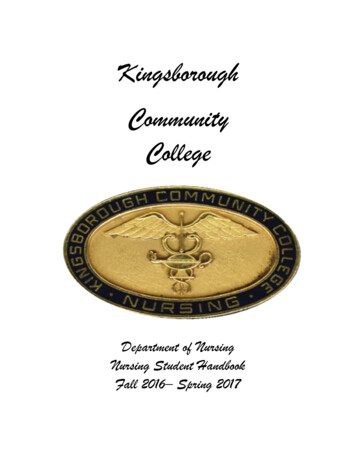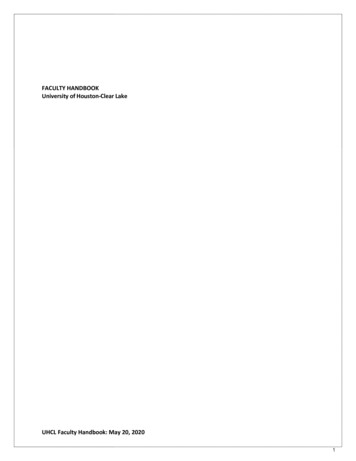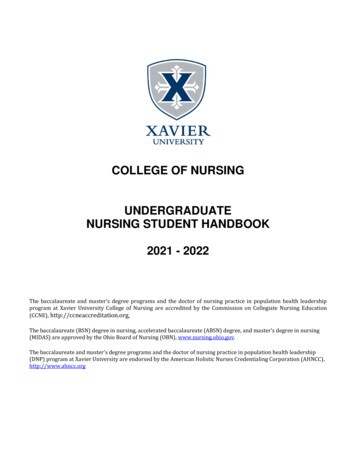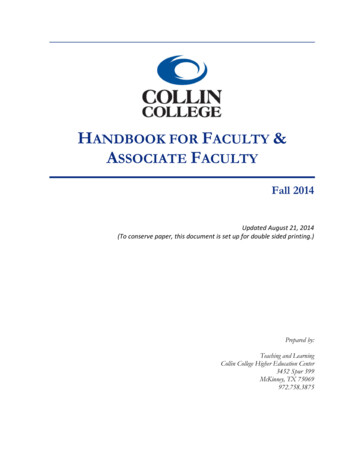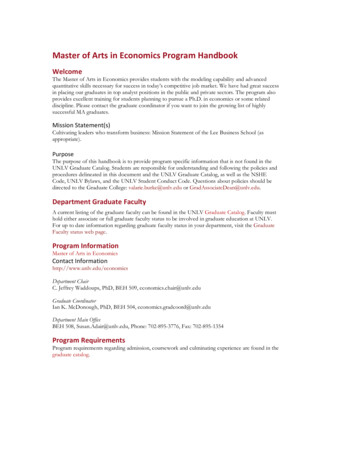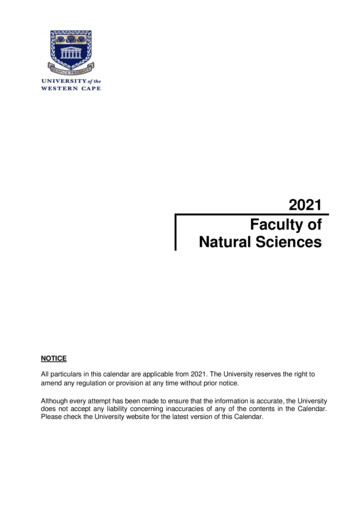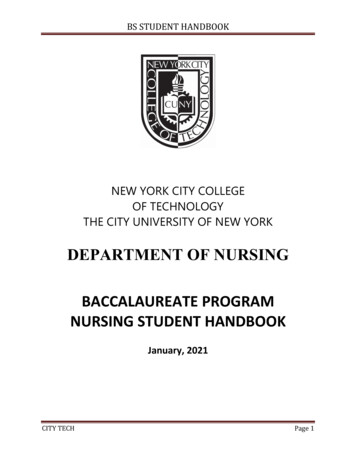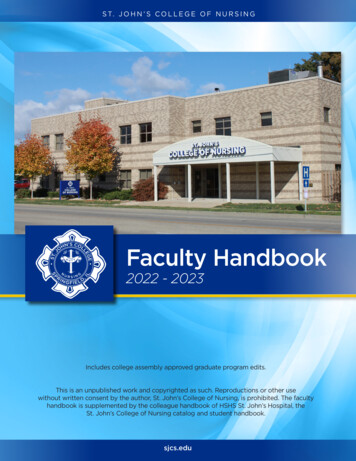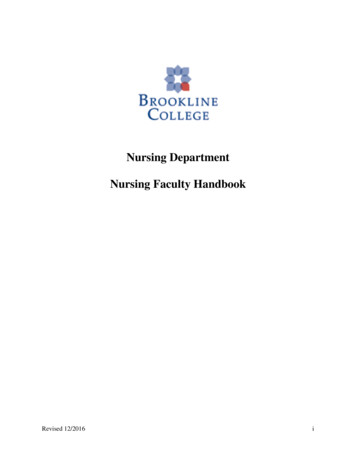
Transcription
Nursing DepartmentNursing Faculty HandbookRevised 12/2016i
TABLE OF CONTENTSINTRODUCTIONBrookline College HistoryAccreditation and ApprovalsBrookline College Mission StatementBrookline College ObjectivesBachelor of Science in Nursing (BSN) Program Mission StatementBSN OutcomesMaster of Science in Nursing (MSN) Program Mission StatementMSN OutcomesNursing Department PhilosophyNursing MetaparadigmsEducational PhilosophyProfessional Characteristics1112223334557FACULTY ROLE AND RESPONSIBILITIESFaculty Employment RequirementsTeaching ResponsibilitiesCollege IDCPR CertificationFaculty Dress CodeDepartment GovernanceFaculty Supervision / Performance/ EvaluationOffice Hours7778888910ACADEMIC POLICIESAcademic Integrity, Plagiarism and Copy Right InfringementClass Lists and Student Attendance /RatioCourse/Syllabus RevisionStudent Assistance/ Student SuccessProblem Resolution101011111112CLINICAL LABORATORY/ALTERNATIVE CLINICAL EXPERIENCES 14Clinical Preparation14Clinical Experiences/Student Assignments15Clinical Instruction15Clinical Deficiency16Evaluating Student Clinical Performance16CONFIDENTIALITY AND SAFETYConfidentialityFERPADrug Screening “For Cause” TestingLatex Allergy/ SensitivityMedication ErrorsExposure GuidelinesInjury/ AccidentsFaculty Health/SafetySecurityRevised 12/201616161617181818191919ii
ParkingBackground ChecksFaculty Workload Policy191920BACHELOR OF SCIENCE IN NURSING (BSN) PROGRAMCurriculum: Traditional BSN TrackCurriculum: BSN/BDG TrackCurriculum: BSN/RN TrackGrading SystemAcademic Progression202122222324MASTER OF SCIENCE IN NURSING (MSN) PROGRAMCurriculum Plan: MSN-Ed TrackCurriculum Plan: MSN-HSA TrackGrading SystemAcademic Progression2424252526APPENDICESAppendix A – Nursing Department Dress CodeAppendix B – Accidental Needle Stick ReportAppendix C – Drug Screening “For Cause” TransportationAppendix D – Student Nurse Action Plan27283132Revised 12/2016iii
INTRODUCTIONThis handbook augments the Brookline College catalog and serves as a source of important informationfor students in the nursing program. It will inform you about important Nursing Department requirementsand describe expectations of nursing students. It is a reference source for information about academicrequirements, Nursing Department policies, and students’ rights and responsibilities.The information contained in the Nursing Student Handbook is subject to change at any time. Studentswill be notified of changes through classroom announcements, email, the Nursing Departmentcommunications board, and on the Nursing Department website.Brookline College HistoryBrookline College was originally incorporated and licensed in Arizona on October 18, 1979 as ArizonaInstitute of Business and Technology (AIBT), a non-profit business and technical school. The institutionwas accredited in 1982 by the Association of Independent Colleges and Schools (now the AccreditingCouncil for Independent Colleges and Schools, ACICS). In 1999, ACICS awarded AIBT Junior Collegestatus and granted approval for the institution to offer the Associate degrees at all campus locations.In 2001, AIBT was awarded Senior College status by ACICS and received approval to offer Bachelor ofArts degrees via online delivery. In 2002, Arizona Institute of Business and Technology becameInternational Institute of Americas (IIA) and opened a campus in New Mexico.The planning of the Nursing Department began in 2001 culminating in its provisional approval by theArizona State Board of Nursing in 2004. In 2004, IIA also received formal approval from ACICS toaward an Associate of Arts degree in Nursing. Subsequently in early 2005, IIA officially opened itsNursing Program at 43rd Avenue and Bethany Home Road as part of the Phoenix Campus. The Schoolwas initially named after Ms. Ethel Bauer because of her tireless work in education and her passion toprovide opportunities for others to advance their careers. The Ethel Bauer School of Nursing is nowknown as the Brookline College Nursing Department.In July 2007, the Hamilton White Group IIA, LLC (now Brookline College, LLC) purchased the assets ofIIA, and changed the school's name to IIA College in March 2008. In June 2009, the institution wasrenamed Brookline College.In June 2010, Brookline College received approval to offer baccalaureate degrees via residential andonline delivery. In June 2011, Brookline College received approval to offer master degrees via residentialand online delivery.Accreditation and ApprovalsBrookline College is accredited by the Accrediting Council of Independent Colleges and Schools(ACICS) to award certificates, diplomas, associate’s degrees, bachelor’s degrees, and master’s degree.Brookline College is licensed and approved to offer the nursing programs by the following state agencies:Arizona State Board of NursingArizona State Board for Private Postsecondary EducationNew Mexico Board of NursingRevised 12/20161
New Mexico Higher Education DepartmentThe Brookline College – Baccalaureate (BSN) nursing programs have been granted initial accreditationby the Accreditation Commission for Education in Nursing (ACEN) (3343 Peachtree Road NE, Suite850; Atlanta, Georgia 30326; 404-975-5000; www.acen.org)The baccalaureate/master’s nursing program at Brookline College is accredited by the Commission onCollegiate Nursing Education, One Dupont Circle, NW, Suite 530, Washington, DC 20036, (202) 8876791.Brookline College Mission StatementBrookline College is an independent, accredited institution dedicated to meeting the educational needs ofa developing multicultural society. The institution is committed to preparing students academically andprofessionally to meet the constantly changing employment requirements of business, industry, publicservice organizations, and medical support agencies functioning in a highly advanced and expandingtechnological community.Brookline College ObjectivesThe objectives of Brookline College are to:1. Provide comprehensive, concentrated, qualitative educational programs, which will guidestudents through the development of the competencies needed to meet the employmentrequirements in a highly technological environment.2. Provide services that will support a diverse student body in their pursuit of postsecondaryeducation on a variety of levels and eliminate the barriers to the completion of their educationalobjectives.3. Provide innovative approaches and methodologies in a non-traditional educational environmentemphasizing a multiplicity of skills.4. Recognize and integrate lifelong learning and academic experiences as they would apply to eachstudent’s program of study.5. Provide students with access to faculty members whose academic qualifications and practicalexperience will provide the valuable leadership necessary to prepare students for successfulintegration into the workplace.6. Provide learners with the academic, cognitive, and professional skills necessary for careeradvancement.7. Provide all students with a hands-on working knowledge of information technology proceduresand applications.Bachelor of Science in Nursing (BSN) Program Mission StatementThe mission of the Nursing Department is to prepare highly competent professional nurses to addresscomplex human needs within a multicultural environment that will improve the health of individuals,families, and communities through the discovery and dissemination of nursing knowledge and thetranslation of science into practice. Faculty facilitate the education of students in the art and science ofnursing to provide ethical, holistic, culturally competent, evidence-based care in collaboration with othermembers of the healthcare team in a variety of health care settings within a constantly evolving healthcare environment. Students, as members of the community in which they receive their education, arestakeholders in the health and welfare of the community they will serve.Revised 12/20162
BSN OutcomesThe Nursing Department has seven (7) student learning outcomes that are derived from the College-widelearning goals, Department mission and philosophy, and professional standards of practice. The graduateof the BSN program:1. Utilizes the nursing process and critical thinking as tools to make culturally-sensitive patientcentered clinical decisions in all health care settings within systems-based environments.2. Collaborates with patients and other members of the healthcare team in the planning,coordination, and provision of competent care.3. Integrates evidence-based findings into nursing and collaborative practice.4. Promotes patient and staff safety utilizing the process of quality improvement based on availableevidence.5. Uses information and technology for communication, knowledge development, and clinicaldecision making.6. Demonstrates leadership behaviors and professionalism when providing care to patients across thelifespan in all health care settings.7. Integrates legal, ethical, and professional standards into nursing practice.The Nursing Department has established five (5) BSN program outcomes. These are:1. NCLEX pass rates: Graduates will achieve a first-time NLCEX-RN pass rate above the nationalaverage.*2. Program completion: 75% of students enrolled in the program will graduate within 150% of thepublished program length.3. Program satisfaction: 85% of graduates will agree or strongly agree they are satisfied with theBSN program.4. Employer program satisfaction: 80% of employers will agree or strongly agree they are satisfiedwith graduates’ competencies.5. Post-graduate activity: 80% of program graduates who pass the NCLEX examination will beemployed as registered nurses within twelve months of graduating or will be enrolled in agraduate program in nursing.*Students in the BSN/RN track are already licensed as registered nurses and therefore outcomes ofNCLEX pass rates are not evaluated for this track.Master of Science in Nursing (MSN) Program Mission StatementThe mission of the Brookline College graduate nursing program is to provide students with theknowledge and skills needed to build upon and advance their nursing practice. Students will learn toapply advanced philosophies, theories, concepts, research findings, and skills to specialty practice.Graduates of the program will be equipped with the knowledge and competencies to assume roles asnursing leaders in multicultural healthcare and academic settings.MSN OutcomesThe Nursing Department has identified six (6) graduate-level Student Learning outcomes that are derivedfrom the College-wide learning objectives, Graduate Nursing mission, Department philosophy, andprofessional standards of practice. The graduate of the MSN program:1. Synthesizes concepts from nursing and other disciplines to build upon and advance professionalnursing practice.2. Integrates evidence-based advanced knowledge and skills into specialist nursing roles.3. Utilizes technologies that support specialist nursing practice through critical thinking, decisionmaking, and interprofessional collaboration.Revised 12/20163
4. Demonstrates the use of leadership strategies that advance the design, implementation andevaluation of specialist nursing practice.5. Functions effectively as a change agent, member and leader of interprofessional teams toinfluence healthcare and nursing practice for individuals, families, populations, and systems.6. Analyzes the impact of social, political, economic and technological trends in healthcare onnursing practice and healthcare delivery.The Nursing Department has established five (5) MSN program outcomes. These are:1. Program completion: 75% of students enrolled in the program will graduate within 150% of thepublished program length.2. Graduate program satisfaction: 85% of graduates will express they are satisfied or highly satisfiedwith the MSN program.3. Employer program satisfaction: 80% of graduates’ employers will express they are satisfied orhighly satisfied with graduates’ competencies.4. Job placement rates: 90% of program graduates will be employed in a specialty nursing rolewithin 12 months post-graduation.5. Professional achievement: 85% of program graduates will engage in continued professionalgrowth through membership in professional organizations, continuing education, specialtycertification, and/or doctoral study in nursing.Nursing Department PhilosophyThe Nursing Department philosophy is consistent with the mission statement of Brookline College andserves as a link between the Nursing Department and the college as it carries out the mission through thenursing curricula. Nursing Department faculty will regularly review and revise the nursing philosophyand program outcomes.The Nursing Department believes nursing is a professional, scientific discipline with academic andpractice dimensions. The discipline has as its primary focus the maintenance and promotion of healthachieved through collaboration with individuals, families, groups, and the community in a manner that isconsistent with society’s expectations and needs. The Nursing Department believes the baccalaureatelevel to be the essential educational preparation for professional nursing practice. Nursing should achievehigher levels of education and practice to the full extent of their education and training.The theoretical underpinnings of professional nursing practice derive from the related disciplines of thenatural sciences, social sciences, and nursing. The profession of nursing builds its knowledge basethrough the rigorous scientific inquiry of theory and practice that continues the process of theorydevelopment and provides the foundation for evidence-based practice. The nursing process establishes thefoundation for critical thinking and decision making skills that allow complex independent judgments tobe made based on available data and knowledge.Nursing competencies are guided by professional standards and include psychomotor and interpersonalskills, collaboration, and leadership using the processes of critical thinking, problem solving, anddecision-making. Advocacy and caring are cornerstones of the role of the professional nurse who acts onbehalf of individuals, families, communities, and global populations.Nurses work autonomously within a defined scope of practice and collaboratively with members of thehealth team. Regulations and standards, such as those defined by state Boards of Nursing, the Scope andStandards of Practice, and the Code of Ethics for Nurses guide nursing practice as nurses are accountableto the public they serve.Revised 12/20164
Scientific and technological advances and the increasing incorporation of nursing research into practicemandates involvement in lifelong learning. Commitments to continuous quality improvement, improvedpatient outcomes, enhanced patient safety, and active involvement within the profession are key elementsin professional nursing.Nursing MetaparadigmsPatientThe patient is the recipient of nursing care and may be a person, family, group, and/or community, eachmoving through its own unique developmental stages. The recipient of care may be conceptualized asholistic, encompassing personal, social, and physical dimensions. Patients are persons with uniquelifestyles, knowledge, beliefs, values, needs, and goals who interact dynamically with their environment,respond to health issues in individualized ways, and are capable of making critical choices. They have aright to participate collaboratively with nurses in decisions and have shared accountability for outcomes.The role of the professional nurse is to foster health promotion activities and to assist the patient/person inoptimizing wellness, including identifying and utilizing resources within all healthcare settings.EnvironmentThe environment comprises both the internal and external contexts of the individual and involvesdynamic forces which affect the health status of the patient. The environment includes forces that arephysical, cultural, social, political, economic, and spiritual. The larger society is a network ofrelationships that link individuals in families and groups. Individuals, as open systems, are in constantinteraction with the environment in a dynamic, mutual exchange. Professional nursing practice considersthe impact of the sociopolitical, legal, ethical, and economic forces on persons, families/groups, andcommunities.HealthHealth may be defined as the state of well-being at a given point in time for a patient. It is amultidimensional adaptive state within a constantly changing environment, characterized by wellness,illness, disease, or dysfunction. Health influences and is influenced by the patient’s developmental level.It is both objective and subjective and encompasses physical, psychosocial, and spiritual dimensions.Health is a relative state with parameters that may be defined differently by diverse cultures. Patients haveresponsibility for their health status through the health choices they make. The role of the professionalnurse is to foster health promotion activities and facilitate adaptation.NursingNursing is a professional, scientific discipline with academic and practice dimensions integrating theoryand practice. The science of nursing is the generation and application of a body of theoretical knowledgeto health care situations. The art of nursing is the synthesis of theoretical knowledge and the experience ofskills learned, translated into competent practice. Nursing care is patient-centered and provided topatients/clients in a wide range of health care settings with the goal of assisting them to achieve maximalhealth through interventions derived from evidence-based practice.Educational PhilosophyThe faculty of the Nursing Department believes that teaching-learning is a continuous, dynamic, andreciprocal process that varies with learner-centered, student encounters according to individual studentneeds and differences. Nursing Department faculty embrace and subscribe to development of a spirit ofinquiry and the ability to think critically in all students as these are essential attributes for all professionalnurses. Faculty pride themselves in promoting and facilitating student-centered learning that leads tostudent self-actualization. This process of fostering and promoting student-centered learning is afoundational and fundamental responsibility of nursing faculty.Revised 12/20165
There is emphasis on the teaching-learning process as a component of the professional nurse role andstudents are encouraged and engaged throughout the nursing curriculum to move toward becomingcontributing and accountable members of the nursing profession and of a global society. Evaluation is astrong thread of the Nursing Department and there is evidence of this thread at all levels of the program,focusing on continuous quality improvement of the program against professional nursing standards andnational bench marks guiding nursing and healthcare delivery in a complex society. Systematic evaluationis conducted regularly by faculty, students, and others involved in the learning process.Educational ProcessNursing Department faculty believe the goal of the educational process is fourfold, to: Help a highly diverse student body become liberally educated professionals. Afford students an opportunity to explore and develop a personal philosophy of nursing that is builtupon a sound theoretical foundation and incorporates practice elements into a seamless continuum of“embodied know-how”. Achieve a balance between theory and practice to achieve fully, dimensional learning. Teach students to value the research process as one that builds on and adds to the foundation of nursingand health care knowledge.Academic EnvironmentNursing Department faculty believe in a learner-centered, facilitative academic environment that deliversnursing education to a diverse student body based on four values: The educational process partners students and faculty in collaborative mentoring relationships thattranscend traditional educational boundaries. The infrastructure aids flexible educational efforts rather than having the infrastructure dictate theeducation that may be offered. There is a synthesis of conceptual and theoretical information with the practical realities of the currenthealthcare environment. Higher education is made accessible to students who are adult learners, who may have families andwho may choose to work.Nursing Department ValuesThe Nursing Department faculty believe in the following eight values on which all nursing education isbased. Treat students as we treat each other, with genuine interest, egalitarian respect, and positive butrealistic expectations, all based on honest and open communication. Be committed to changing people’s lives and facilitating students’ desire to achieve an education,with a focus on living, learning, growing, and achieving. Be dedicated to providing education with passion and inspiration in a way that instills a commitmentto lifelong learning. Participate in out-of-class teaching and mentoring, whenever and wherever the teachable momentoccurs. Be committed to doing whatever it takes to help a student, whether in class, in an office, on thetelephone, or in e-mail. Provide contemporary experiential and theoretical knowledge engaging with students and bring asense of fun and adventure to the hard work. Participate in continuing education activities to promote professional growth. Support evidence-based learning activities.Revised 12/20166
Professional CharacteristicsAs a profession, nursing places great reliance upon individual responsibility and accountability.Therefore, students are held responsible and accountable for their professional behavior.Personal CharacteristicsStudents are expected to exhibit personal and emotional characteristics consistent with the professionalnurse role. Students who do not manifest these characteristics may be referred to the Dean of Nursing ordesignee and advised or required to seek appropriate assistance. Students who refuse to obtain assistanceand/or persist in exhibiting inappropriate behaviors will not be permitted to continue in the nursingprogram. Students whose behavior indicates issues related to professional ethics and a sound moralfoundation place themselves at risk for course failure or dismissal from the program.Students may also be dismissed from the program for exhibiting improper behavior or professionalmisconduct. Such behaviors include but are not limited to: rude or inappropriate behavior, fighting oncampus or institutional grounds, plagiarism, breaching patient/student confidentiality, compromising thesafety of a patient, or unsafe nursing care. The Brookline College Student Code of Conduct policy may befound in the College Catalog. Instances of such behavior may be documented and the student referred tothe Dean.FACULTY ROLE AND RESPONSIBILITIESFaculty Employment RequirementsAll faculties in the nursing department are required to provide or obtain the following at time of hire:1. Completed Human Resources packet (including I-9)2. Current Resume/Curriculum Vitae3. Current, unrestricted Arizona RN license or current, unrestricted license from a compact state4. Current CPR card5. Current Immunizations - Clinical faculty must have current immunizations and proof of negativeTB status6. Social Security card7. Official Transcripts - faculty are required to provide official transcripts for all degrees8. Faculty ID Badges are required for all faculty and are issued upon hire9. Fingerprint Clearance CardAll nursing faculty teaching didactic courses are required to have a minimum of two years of direct careclinical experience and possess a minimum of a master’s degree in nursing. The Nursing Department iscommitted to having all faculties, didactic as well as clinical, possess a master’s degree in nursing. Allnursing faculty teaching clinical courses are required to have a minimum of three years direct care clinicalexperience or clinical instructor experience within the last five years; and possess a minimum of amaster’s degree in nursing,Teaching ResponsibilitiesFaculty responsibilities include:1. Planning student learning activities to meet course objectives2. Clearly articulating expectations for teaching/learning3. Assessing student learning4. Mastering course material and presenting in stimulating and creative ways5. Selecting and evaluating textbooks and other academic resources6. Providing timely feedback on student assignments7. Facilitating student remediation or tutoring8. Making appropriate referrals for students experiencing difficultyRevised 12/20167
9.10.11.12.13.14.Revising and updating courses as neededMaintaining records of class attendanceSubmitting grades on timeSharing and collaborating with colleaguesInstilling respect for the professionDeveloping a plan for ongoing professional growthCollege IDFaculty will be issued identification cards that are needed to enter affiliating clinical sites; ID must beworn at all times while on campus or in clinical experiences.CPR CertificationFaculty must maintain current CPR certification which includes rescue and care of adults, children,infants, and choking resuscitation. Faculty are required to carry and have a copy in their file an AmericanHeart Association (AHA) Healthcare provider card. CPR certification by any other provider will not beaccepted.Faculty Dress CodeThe purpose of a dress code is to allow employees to work comfortably while projecting a professionalimage to students, coworkers, and community stakeholders. The dress code for the Nursing Department isbusiness casual. For full detail on the faculty dress code please see Appendix A.ProfessionalismWhile Brookline College supports the faculty-student mentoring model, it is not permitted for faculty andstudents to engage outside of the learning environment within social media or non-school approved socialevents while each party is engaged in an academic relationship (didactic, laboratory, clinical, simulation,administration).Department GovernanceUnder the leadership and direction of the Dean, Nursing Department faculty are responsible fordetermining, implementing, and evaluating educational policy for the nursing program and participatingin the governance of the department through the departmental committee structure. Full time faculty arerequired to serve on departmental committees for two year terms, contributing to curricular andgovernance decisions. Part time and adjunct faculty are encouraged to participate in committees. Each fulltime faculty member will serve on at least one committee and will be invited to volunteer to serve on thecommittee of their choice; each committee will elect a chair at its first meeting in the fall semester of eachyear unless otherwise indicated. Committee chairs provide general oversight to the committee process.The role of the chair is to: coordinate meeting dates/times; ensure follow-up of assigned tasks; ensuremeeting minutes are completed and distributed; provide committee reports at department meetings. TheDean is an ex officio member of all committees.Committees include:Admission, Progression, and RetentionThe purpose of the Admission, Progression, and Retention (APR) Committee is to address areas related toadmission, progression, retention, and graduation.Functions:1. Review and revise admission criteria2. Review and revise policies related to admission, progression, and graduation3. Monitor and track student academic progress4. Coordinate support for student successRevised 12/20168
5. Review student issues in collaboration with the PASS coordinatorCurriculumThe purpose of the curriculum committee is to monitor the development, implementation, coordination,and evaluation of the BSN curricula.Functions:1. Evaluate the curriculum objectives in relation to the mission and program student learningoutcomes2. Review new course offerings or proposed course revisions prior to submission to the full faculty3. Maintain current syllabi4. Review faculty course evaluations as an assessment of the curriculumClinical PracticeThe purpose of the Clinical Practice committee is to address any issue related to the clinical education ofstudents.Functions:1. Ensure consistent teaching current practices in clinical, lab, and simulation settings2. Provide an annual review of clinical learning experiences and recommendations for newexperiences3. Review clinical course evaluations as an assessment of program outcomes4. Review and revise student formative/summative clinical evaluation toolsEvaluationThe purpose of this committee is to coordinate all activities related to ongoing program, course, andstudent evaluation.Function:1. Collect data related to the systematic evaluation plan2. Review, revise, maintain the systematic evaluation3. Recommend program changes related to data analysis and findingsStudent AffairsThe purpose of the Student Affairs committee is to facilitate student self-governance, student scholarlyactivities, and student participation in the activities of the college.Functions:1. Consider needs and concerns of students and make recommendations to faculty andadministrationa. Facilitate Student Leadership Council meetingsb. Facilitate Town Hall meetingsc. Facilitate communication via newsletter, bulletin board, social mediad. Identify, recommend, evaluate student resources2. Review and recommend changes in student policies and procedures3. Review and recommend changes in student handbook4. Plan, coordinate, implement, and evaluate school-sponsored programs and service initiatives.Minutes will be taken by committee members on a rotating basis. Minutes of each meeting will bemaintained electronically. At each Department Meeting, committee chairs will report on activities, solicitfaculty input, and raise items for discussion and vote by the full faculty.Department committees meet at least once each semester. All full-time faculty are required to attend; allpart-time
The Brookline College - Baccalaureate (BSN) nursing programs have been granted initial accreditation by the Accreditation Commission for Education in Nursing (ACEN) (3343 Peachtree Road NE, Suite 850; Atlanta, Georgia 30326; 404-975-5000; www.acen.org)
